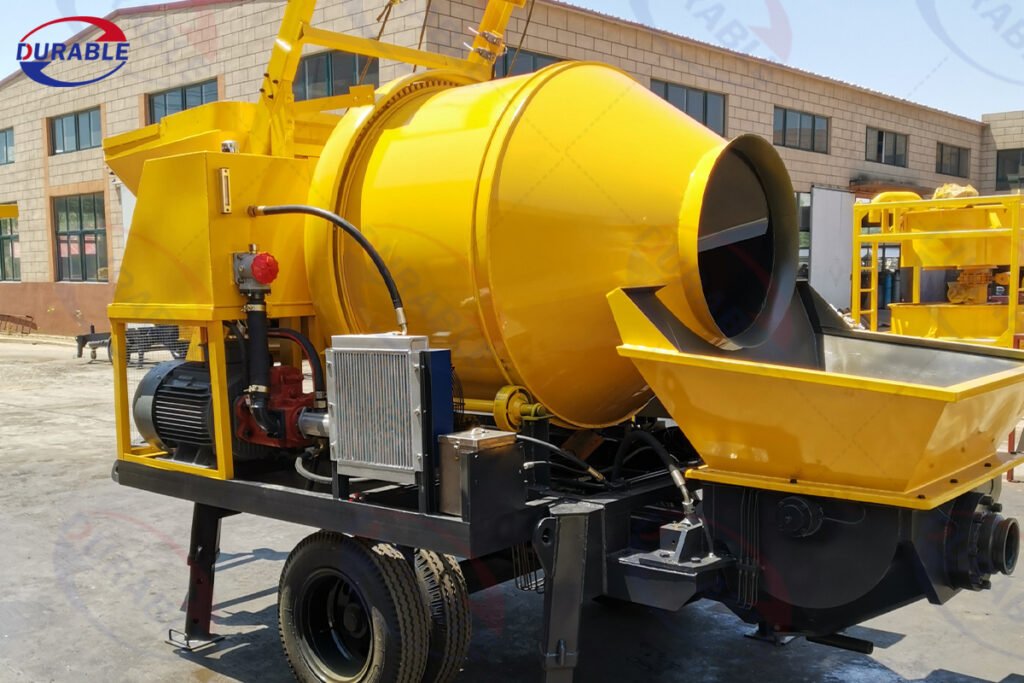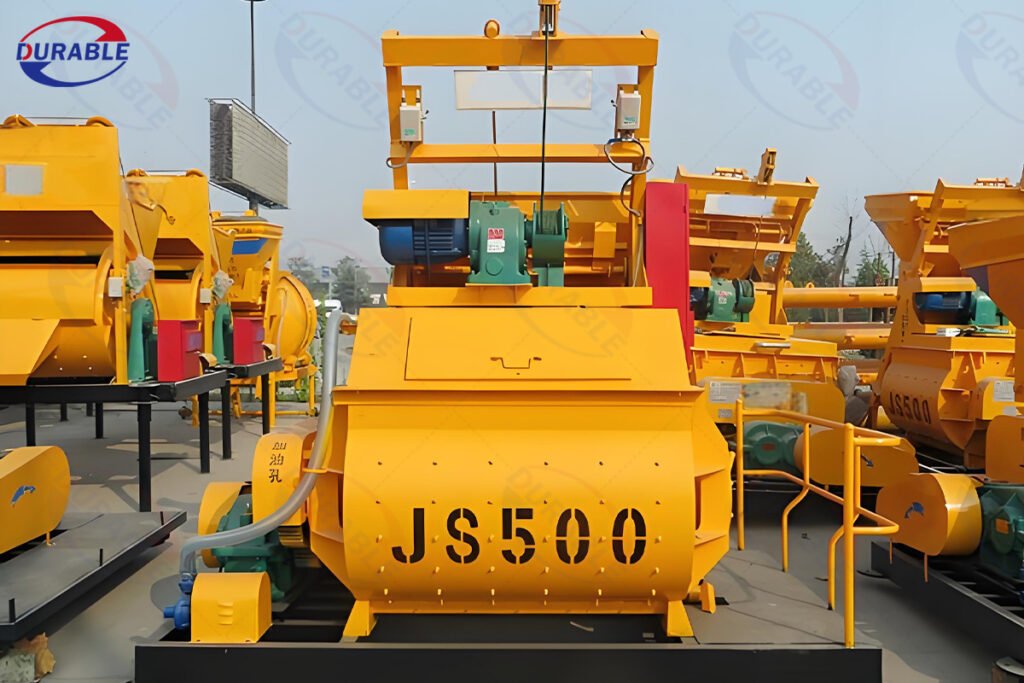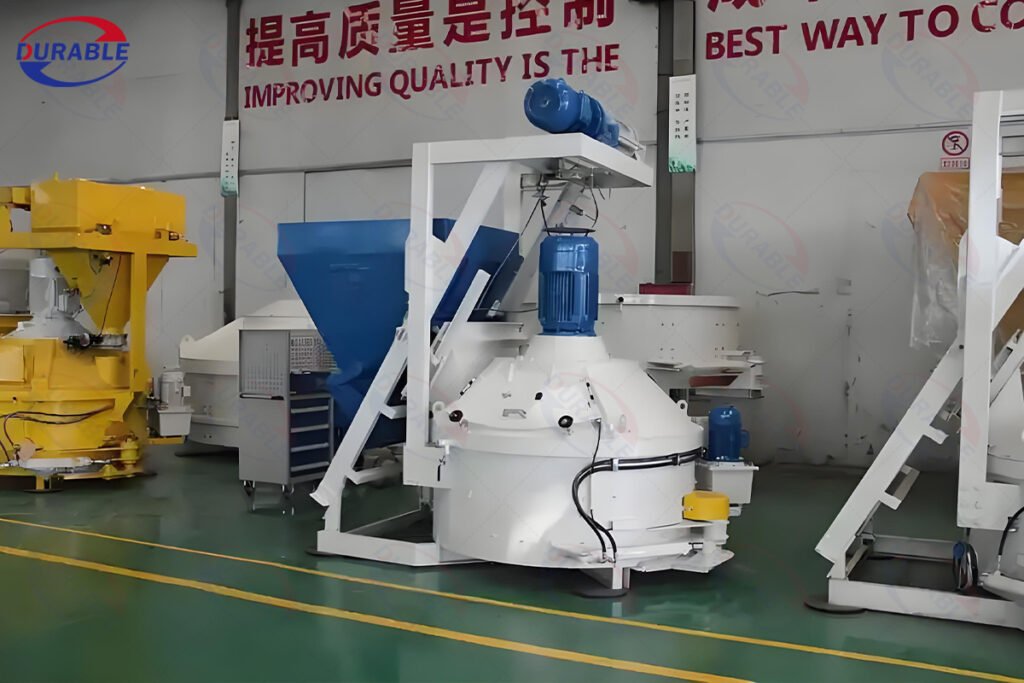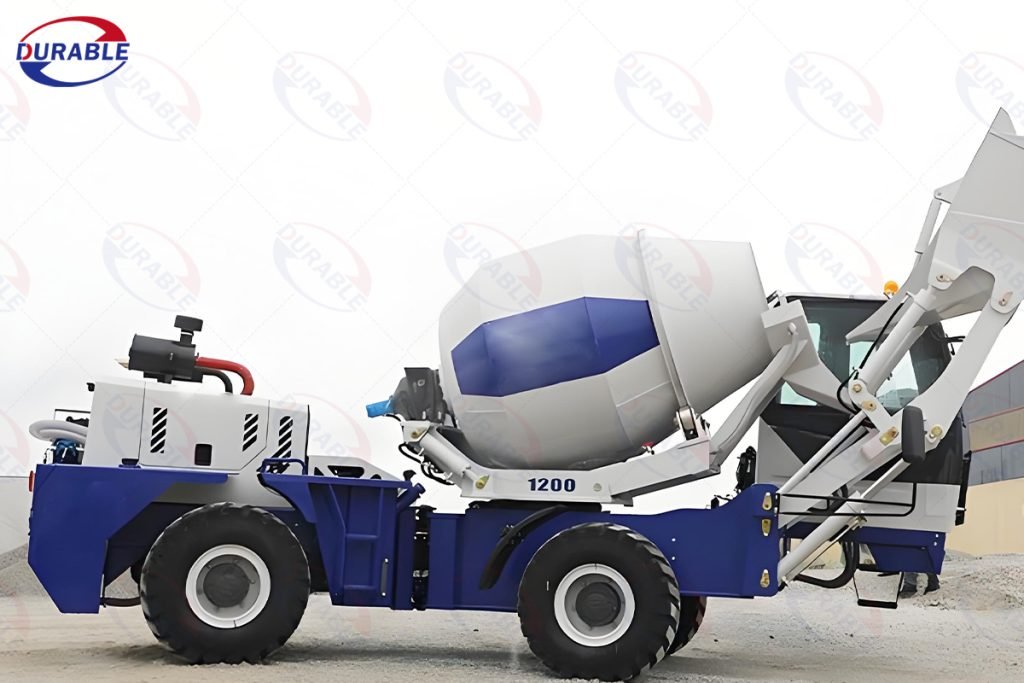Ultimate Concrete Mixer Price Guide: 7 Key Factors for Your Cost
When you decide to buy a concrete mixer, the first thing you notice is the massive price range. You can find options from a few thousand dollars to well over a hundred thousand. As a concrete mixer manufacturer with experience since 2001, we at Durable Machine understand this can be confusing. The truth is, a “concrete mixer” is not a single product. It is a category of machines, each designed for a specific job, scale, and level of durability. The concrete mixer price is a direct reflection of these design choices.
This guide is designed to make you an informed buyer. We will break down the 7 most important mixer price factors that influence your final mixer procurement cost. Understanding these will not only help you interpret a concrete mixer quotation but also ensure you invest in a machine that delivers the best long-term value, rather than just the lowest initial price.
Table of Contents
- How does your project type determine the right mixer for you?
- How does production capacity directly impact the mixer price?
- How does your job site determine the power system you need?
- How do materials affect the durability and long-term cost?
- How does configuration affect the total price?
- How does manufacturer choice affect price and service?
- How can you get a transparent and detailed quotation?
- Common Questions About Concrete Mixer Prices
- Summary and Final Advice
- About Durable
How does your project type determine the right mixer for you?
The most fundamental price factor is the mixer’s intended application. Are you buying a mixer for a high-volume batching plant or for small, independent construction jobs?
This decision determines the mixer’s entire structure and mixing principle. For small, mobile jobs like residential foundations or repair work, a simple drum mixer is often sufficient. These are less expensive, portable, and easy to operate. A diesel concrete mixer is a popular choice for this kind of work due to its self-contained power.
However, if you are setting up a commercial concrete batching plant, you need a powerful, high-efficiency machine. This means a stationary, compulsory mixer. The JS series concrete mixer, a type of twin-shaft compulsory mixer, is the industry standard for this application. These mixers use intense mechanical force to produce highly uniform concrete very quickly. Their complex design, powerful motors, and robust construction mean their compulsory mixer price is significantly higher, but they are essential for high-volume, quality-controlled production.
How does production capacity directly impact the mixer price?
The single biggest driver of a mixer’s base price is its production capacity. This is measured by the mixer’s discharge volume, typically in liters. A larger mixer requires a bigger drum, a more powerful motor, a stronger gearbox, and a more robust frame, all of which increase the cost. You need to realistically assess your project’s demand to select the right size.
To give you a clear idea, here’s a breakdown of common JS series twin-shaft mixer models and their estimated price ranges.
| Mixer Model | Discharge Capacity (L) | Theoretical Productivity (m³/hr) | Estimated Price Range (USD) |
|---|---|---|---|
| JS500 | 500 L | 25 m³/hr | $5,000 – $9,000 |
| JS750 | 750 L | 35 m³/hr | $8,000 – $14,000 |
| JS1000 | 1000 L | 60 m³/hr | $12,000 – $20,000 |
| JS1500 | 1500 L | 90 m³/hr | $18,000 – $30,000 |
Please note these are baseline estimates for the mixer unit itself. The final concrete mixer quotation will change based on the other factors we are about to discuss. A mixer that is too small will bottleneck your operation, while one that is too large is a waste of capital.
How does your job site determine the power system you need?
Your choice of power source is dictated by your work environment and has a notable impact on both the initial concrete mixer price and long-term operating costs.
The power system is the heart of your mixer. The two main options are an electric motor or a diesel engine.
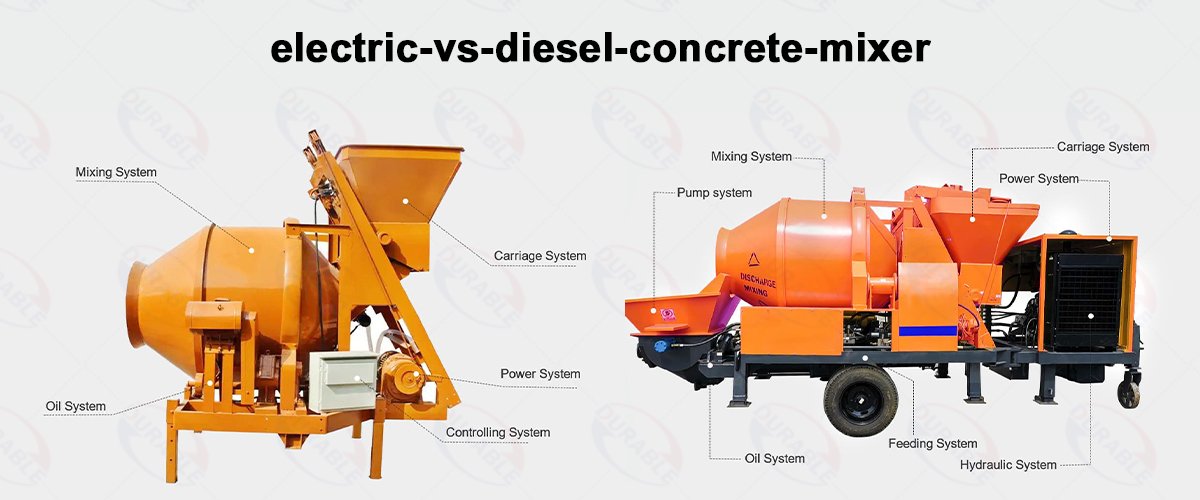
- Electric Mixers: These are the standard for stationary applications like concrete batching plants. They are more energy-efficient, have lower maintenance costs, produce fewer emissions, and are quieter to operate. They are cheaper to purchase initially, but they require a stable and sufficient three-phase power supply at the job site.
- Diesel Mixers: A diesel concrete mixer is the perfect solution for remote job sites, road repairs, or any location without reliable access to electricity. They offer complete mobility and independence. However, this flexibility comes at a cost. The initial purchase price is higher due to the cost of the engine, and the long-term mixer maintenance cost is also greater, including fuel, oil changes, and engine servicing.
How do materials affect the durability and long-term cost?
The quality of the steel and wear parts used in a mixer is a hidden but critical factor that significantly affects its durability, lifespan, and total cost of ownership.
Two mixers can look identical on the outside but have vastly different prices. The difference often lies in the materials used for construction. At our company, we believe this is where a smart investment pays off.
Focus on these key components:
- Mixing Drum Steel: What is the thickness of the steel plate? A cheaper mixer might use 8mm thick steel, while a heavy-duty one will use 10mm or 12mm thick steel plate, making it much more resistant to abrasion and impact.
- Wear-Resistant Liners: The inside of the drum is protected by liners. The best option is a mixer wear-resistant liner made from high-chromium cast iron. This material is extremely hard and can last for thousands of mixing cycles. Cheaper alternatives wear out quickly, leading to costly downtime and replacements.
- Mixing Blades/Paddles: Like the liners, these are high-wear parts. High-chromium cast iron blades maintain their shape and mixing efficiency for much longer than standard steel, ensuring consistent concrete quality.
A mixer built with superior materials will have a higher initial concrete mixer price, but it will save you a fortune in reduced mixer maintenance cost and lost production time over its lifespan. This is a core part of the total cost of ownership of a mixer.
How does configuration affect the total price?
The level of automation and the specific configuration of components like the feeding system directly influence the mixer’s efficiency and overall price.
How you get materials into the mixer and how you weigh them are key configuration choices.
The mixer feeding method is a major decision:
- Skip Hoist Feeding: This system uses a small bucket that runs up a track to dump materials into the mixer. It is a simple, cost-effective design with a small footprint, making it popular for smaller plants.
- Belt Conveyor Feeding: This method uses a long conveyor belt to transport aggregates to the mixer. It is faster, more stable, and allows for continuous feeding, making it the preferred choice for high-capacity plants. However, it requires more space and has a higher initial cost.
Additionally, the sophistication of the weighing and control system adds to the cost. A basic system might use a simple control panel with manual buttons. A fully automatic PLC (Programmable Logic Controller) system offers precise, recipe-based batching, data logging, and inventory management. This automation significantly increases the initial mixer procurement cost but pays for itself through improved accuracy, reduced waste, and lower labor requirements.
How does manufacturer choice affect price and service?
The price difference between a well-known brand and a local or factory-direct manufacturer often reflects overheads, but more importantly, it reflects the value of after-sales service.
When you buy a concrete mixer, you are not just buying a machine; you are entering a long-term relationship with the supplier. A well-established concrete mixer manufacturer may have higher prices due to branding and distribution networks. As a factory-direct manufacturer, Durable Machine is able to offer competitive pricing by eliminating middlemen.
However, the cheapest price is not always the best value. The real value of a good supplier is revealed after the sale.
- Technical Support: Can they provide expert guidance during installation and commissioning?
- Spare Parts Availability: How quickly can you get critical wear parts like liners and blades? A plant that is down for a week waiting for a part can cost you more than the initial price difference.
- Warranty: Does the manufacturer stand behind their product with a comprehensive warranty?
Strong after-sales support is a crucial part of your investment. It ensures your machine stays productive and protects you from costly, unexpected downtime.
How can you get a transparent and detailed quotation?
To get an accurate and comparable quotation, you must provide potential suppliers with a clear and detailed list of your specific requirements.
A professional supplier will not just give you a price; they will ask you questions to understand your needs. To get the best concrete mixer quotation, be prepared to answer the following:
- Project Type: Will the mixer be used in a batching plant or for standalone projects?
- Required Capacity: What is your target output in cubic meters per hour (m³/h)?
- Materials to Mix: What kind of aggregates and cement will you be using?
- Power Source: Do you have access to stable three-phase electricity, or do you need a diesel engine?
- Automation Level: Do you need a simple manual control panel or a fully automatic PLC system?
- Feeding Method: Do you prefer a skip hoist or a belt conveyor for your aggregates?
- Installation Location: Where is your project site? (This is important for shipping cost calculation).
Providing this information will allow manufacturers to prepare a detailed proposal that accurately reflects your needs, enabling you to compare offers effectively and make the best decision for your business. For other mobile solutions, a self-loading concrete mixer might also be a viable option to consider.
Common Questions About Concrete Mixer Prices
Question 1: What is a typical price for a small JS500 concrete mixer?
The concrete mixer price for a standard JS500 model can range from $5,000 to $15,000. The final price depends heavily on the motor brand, the quality of wear parts, and the control system you choose.
Question 2: Is it cheaper to buy directly from a Chinese manufacturer?
Yes, buying directly from a concrete mixer manufacturer like us in China can be more cost-effective as it eliminates distributor markups. However, it’s crucial to verify the manufacturer’s quality standards, production capabilities, and after-sales support.
Question 3: How much do wear parts like liners and blades add to the cost?
A full set of high-chromium wear parts can represent 10-15% of the mixer’s initial price. While it seems like a high cost, they can last 3-4 times longer than cheaper alternatives, making them a much better long-term investment.
Question 4: Does the price include shipping and installation?
Typically, the initial concrete mixer quotation is for the equipment itself (FOB price). Shipping, insurance, customs duties, and installation are usually quoted separately. Always ask for a clear breakdown of all potential costs.
Summary and Final Advice
When evaluating the concrete mixer price, it is crucial to look beyond the number on the quotation. The true value lies in the total cost of ownership. A slightly higher initial mixer procurement cost for a machine with superior build quality, high-chromium wear parts, and reliable manufacturer support will result in lower mixer maintenance cost and greater uptime, making it a more profitable investment in the long run.
Always provide your supplier with your specific needs: your project type, required capacity, and site conditions. This will allow them to provide a transparent and detailed concrete mixer quotation that meets your exact requirements, ensuring you get the right machine for the job.
About Durable
Since our founding in 2001, Durable Machine has been a trusted global concrete mixer manufacturer. We specialize in engineering and producing high-performance compulsory mixers that serve as the heart of concrete plants worldwide. With factory-direct sales to over 120 countries, we are committed to delivering equipment that offers the perfect balance of performance, durability, and value, backed by expert support you can count on.
Contact our engineering team today to discuss your project, and we will provide a detailed quotation for a mixer built to last.
 Durable Machinery
Durable Machinery
